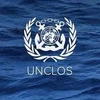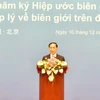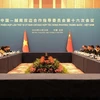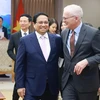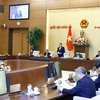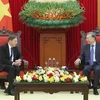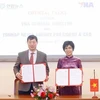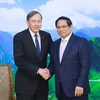President Truong Tan Sang and his wife arrived in Tokyo on March 16, beginning his State visit to Japan at the invitation of Emperor Akihito and Empress Michiko.
President Sang and his entourage were warmly welcomed by member of Japanese House of Representatives and Deputy Foreign Minister Hirotaka Ishihara and Vietnamese Ambassador to Japan Doan Xuan Hung, among others.
On the day, the State leader was set to meet with the Governor of Ibaraki prefecture and visit several agricultural research, machinery manufacturing and flower processing facilities in the locality.
This is the president’s first ever State-level visit to Japan , which will last until March 19. In that time, he and Japanese Prime Minister Shinzo Abe are expected to discuss ways to expand cooperation in economics, politics, security, agriculture and culture, contributing to lifting bilateral ties to new heights.
Minister-Counsellor of the Japanese Embassy Hideo Suzuki described President Sang’s visit as an important political event strongly furthering the bilateral relationship when both region and world are changing rapidly.
Vietnam and Japan have seen their relationship develop rapidly in recent years. Japan was the first country in the Group of Seven (G-7) to welcome the Vietnamese Party General Secretary to Japan in 1995, establish a strategic partnership with Vietnam in 2009 and recognise Vietnam’s market economy in 2011.
Visits are regularly made by the two sides’ leaders, helping consolidate political confidence and put forth measures to boost bilateral partnership.
Japan remains the leading ODA donor to Vietnam, providing a total amount of 2.1 trillion JPY (21 billion USD) in ODA to the Southeast Asian country from 1992 to 2012. The figure reached 1.55 billion USD in 2013.
Last year, the country was Vietnam’s fourth biggest trade partner, with two-way trade hitting 25.16 billion USD, of which Vietnam earned 13.5 billion USD from selling mainly seafood, crude oil, garments and coal.
Japan was Vietnam’s leading investor with its capital totalling 5.7 billion USD in 2013. As of last December, it had 2,166 valid FDI projects in Vietnam, with a total registered capital of 34.7 billion USD.
In addition, the two countries have also enjoyed fine development in bilateral cooperation in the fields of culture, sports, tourism, education and science and technology.-VNA
President Sang and his entourage were warmly welcomed by member of Japanese House of Representatives and Deputy Foreign Minister Hirotaka Ishihara and Vietnamese Ambassador to Japan Doan Xuan Hung, among others.
On the day, the State leader was set to meet with the Governor of Ibaraki prefecture and visit several agricultural research, machinery manufacturing and flower processing facilities in the locality.
This is the president’s first ever State-level visit to Japan , which will last until March 19. In that time, he and Japanese Prime Minister Shinzo Abe are expected to discuss ways to expand cooperation in economics, politics, security, agriculture and culture, contributing to lifting bilateral ties to new heights.
Minister-Counsellor of the Japanese Embassy Hideo Suzuki described President Sang’s visit as an important political event strongly furthering the bilateral relationship when both region and world are changing rapidly.
Vietnam and Japan have seen their relationship develop rapidly in recent years. Japan was the first country in the Group of Seven (G-7) to welcome the Vietnamese Party General Secretary to Japan in 1995, establish a strategic partnership with Vietnam in 2009 and recognise Vietnam’s market economy in 2011.
Visits are regularly made by the two sides’ leaders, helping consolidate political confidence and put forth measures to boost bilateral partnership.
Japan remains the leading ODA donor to Vietnam, providing a total amount of 2.1 trillion JPY (21 billion USD) in ODA to the Southeast Asian country from 1992 to 2012. The figure reached 1.55 billion USD in 2013.
Last year, the country was Vietnam’s fourth biggest trade partner, with two-way trade hitting 25.16 billion USD, of which Vietnam earned 13.5 billion USD from selling mainly seafood, crude oil, garments and coal.
Japan was Vietnam’s leading investor with its capital totalling 5.7 billion USD in 2013. As of last December, it had 2,166 valid FDI projects in Vietnam, with a total registered capital of 34.7 billion USD.
In addition, the two countries have also enjoyed fine development in bilateral cooperation in the fields of culture, sports, tourism, education and science and technology.-VNA












